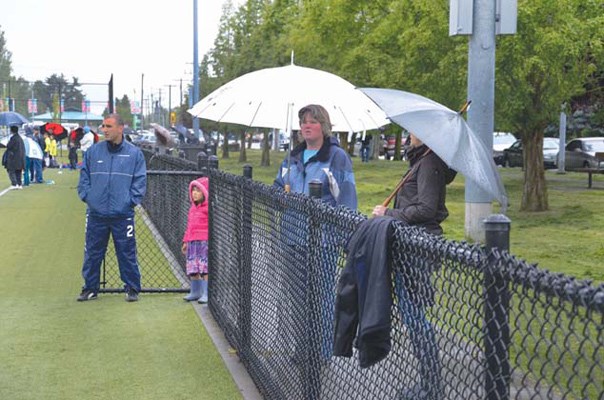During the game, theres cheering, jeering, screams to pass or shoot and howls for a foul.
But in the end, theres only one voice that matters and it belongs to the coach.
Thats the mantra generating from the Richmond Youth Soccer Association (RYSA) when it comes to the red card issue of parents trying to coach from the side of the field.
RYSA, the nucleus for boys soccer in the city for 58 years with more than 1,300 players, said its blessed with a generation of generally well-behaved parents who interact positively with players and coaches alike.
The association is not blind, however, to the thankfully infrequent occasions when an over-zealous parent tries to direct their child during a game.
We try to make sure theres only one voice during a game, said Huw Harris, who has been on the RYSA board for four years and been in charge of coach/parental education for three years.
Kids will almost always listen to their parents. They might have respect for the coach, but if they hear instructions from the parent and its contradictory to the coach, it puts the kid in the situation where theyre going to have to upset someone and thats a problem.
The kids must have an environment where they have fun and are allowed to make mistakes, because, ultimately, we want them to play soccer for the rest of their lives.
At a recent tournament, too many parents were coaching a particular Richmond team, not least because both players and parents were relatively new to the competitive environment.
I admit, we could have prepared better for it, but (the sideline coaching) really did the kids a disservice, said Harris.
The coaches sometimes have technical areas, but theyre usually on the opposite (side of the field) from the parents.
Thats perceived as a good thing by some, but, as a coach, I wasnt aware of the coaching going on from the parents until I was told much later.
Harris would prefer to be on the same side as the parents, so he can hear when someone is stepping out of line.
Even then, it totally distracts the coaches from what theyre supposed to be doing and cant be anything but detrimental. And if theyre on the other side of the field, they cant possibly know what messages the player is receiving from the coach.
The parents often have the best of intentions, added Harris, but even the smallest of instructions could be the opposite of what the player was asked to do.
Parents, of course, have every right to be at the field, and players, coaches and their clubs all want them there, because they play an integral role in the community-driven organization.
Everything they do or say, before, during and after a game or practice session, can add to the joy a child feels when walking onto the field in their teams jersey.
Be positive, dont coach, dont add pressure to your child, it can do nothing but worsen the situation, said Harris.
After a game or practice, theres only two things you should be saying, did you have fun? and what do you want to eat?
The kid will open up and tell you what they want to talk about in terms of the game, if at all.
RYSAs chairman Doug Long, whos also the clubs long term player development officer, said he can think of multiple moments when a parent, usually the dad, is giving instruction during a game and trying to deliver so-called coaching points.
I have seen players eyes popping out of their heads when this happens. Its pretty unfair to the player, added Long, a former provincial player and the clubs technical director for seven years before.
Ill watch my own daughter playing and think something needs to change or something different needs to be done, but I have to have the discipline to say nothing.
And if the player is hearing it from the parent at the side, you can bet your last dollar the referee, many of them only teenagers themselves, are also on the receiving end.
Adult referees will have developed a thick skin over the years. They might not like it, but they are better prepared to deal with it, said Long.
But for kids, kids take it very personally and will end up leaving the game altogether. We need our refs, the game cant go on without them.
Quite often, Long said hell remind parents that if they dont have anything nice to say, then dont say anything at all.
I remember a game many years ago when some of our parents were getting a little too loud, recalled Long.
I called the referees attention. I asked him to stop the game so that I could go speak to our parents. I walked across the field and said to them, guys, you are being way too loud and on the refs back too much. If you dont quieten down, Ill have to ask you to step back 20 yards. It worked.
Overall, our parents are pretty good. It was just that one time they got carried away.
Whether its parents getting on the backs of players, coaches or the refs, coaches, Long insists, set the tone for the model of behaviour and have to lead by example.
If you have too many coaches shouting too many instructions, the parents tend to think its open season, he added.
We have a code of conduct that has to be signed to get through the registration system, and we also have a BC Soccer reference guide, which helps educate the parent.



